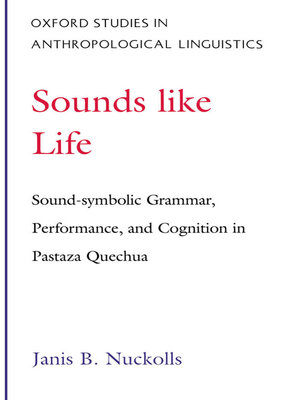Sounds Like Life
ebook ∣ Sound-Symbolic Grammar, Performance, and Cognition in Pastaza Quechua · Oxford Studies in Anthropological Linguistics
By Janis B. Nuckolls

Sign up to save your library
With an OverDrive account, you can save your favorite libraries for at-a-glance information about availability. Find out more about OverDrive accounts.
Find this title in Libby, the library reading app by OverDrive.



Search for a digital library with this title
Title found at these libraries:
| Library Name | Distance |
|---|---|
| Loading... |
Sound-symbolism occurs when words resemble the sounds associated with the phenomena they attempt to describe, rather than an arbitrary representation. For example the word raven is arbitrary in that it does not resemble a raven; cuckoo, however, is sound -symbolic in that it resembles the bird's call. In Sounds Like Life, Janis Nuckolls studies the occurrence of sound-symbolic words in Pastaza Quechua (a dialect of Quechua), which is spoken in eastern Ecuador. The use of sound-symbolic words is much more prevalent in Pastaza Quechua than in any other language, and they symbolize a wider range of sensory perceptions including sounds, rhythms, and visual patterns. Nuckolls uses discourse data from everyday contexts to demonstrate the Quechua speakers' elaborate schematic perceptual structure to describe experience through sound-symbolic language. With words for contact with a surface, opening and closing, falling, sudden realizations, and moving through water and space, Nuckolls finds that sound-symbolism is integral to the Quechua speakers' way of thinking about and expressing their experience of the world.







